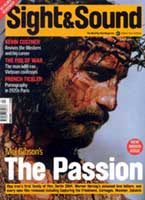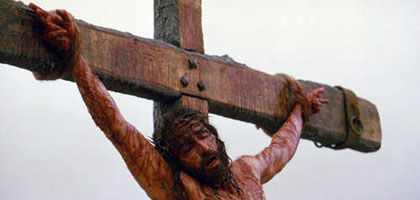
The Passion of the Christ
USA 2004

Reviewed by Mark Kermode
Synopsis
Our synopses give away the plot in full, including surprise twists.
Night-time in the Garden of Gethsemane, AD 33. After being taunted by the Devil, and betrayed by Judas, Jesus is arrested. He is tried by the Pharisees. The High Priest Caiphas demands the death penalty from Roman governor Pontius Pilate, who defers to King Herod. When Herod returns Jesus unjudged, Pilate offers the people the freedom of Jesus or of the murderer Barabbas; they choose Barabbas. Pilate orders Jesus to be flogged, and then parades him before the crowd, who again demand his crucifixion. Symbolically washing his hands, Pilate orders his soldiers to comply.
Judas commits suicide. Jesus carries his cross to Golgotha, aided by Simon as his strength fails. On the cross, Jesus promises salvation to a repentant criminal and prays for the forgiveness of his persecutors. At the moment of death an earthquake rips open the temple. In the tomb, Jesus rises from the dead.
Review
Throughout its production Mel Gibson's ambitious religious opus was dogged by charges of anti-Semitism: pre-emptive accusations inspired by everything from his father Hutton Gibson's much quoted opinions on the Holocaust to Mel's admiration for eccentric 19th-century 'visionary' Anne Catherine Emmerich, whose writings partly inspired the movie. Now finally unveiled, The Passion of the Christ shows little sign that Gibson was overly troubled either by the demands of his detractors (who called for radical script revisions) or by the cautioning guidelines of the Second Vatican Council's 'Nostra Aetate' (its declaration on the relationship of the Church to non-Christian religions). In particular, the infamous 'blood libel' line from Matthew ("His blood be on us and upon our children") appears to remain - albeit unsubtitled - in the mouth of Caiphas, the Jewish High Priest whom Gibson portrays as bullying Pontius Pilate into crucifying Christ. Apart from being historically obtuse (Pilate was a thug who needed no encouragement for crucifying Jews), this dramatic conceit has reinforced charges of bigotry from those who doubt Gibson's motives. Even the US Conference of Catholic Bishops, who concluded that "the Jewish people are at no time collectively blamed for Jesus' death", were troubled by the film's portrayal of Caiphas and his cohorts as "almost monolithically malevolent" while noting that Pilate receives "overly sympathetic" treatment as "vacillating, conflicted and world weary... averse to unnecessary roughness and easily coerced by... his Jewish subjects."
While such debates are of vital import to those who consider The Passion of the Christ a declaration of religious and historical faith, their significance is perhaps diminished when the film is considered within the cannon of exploitation cinema to which it also belongs. Despite the use of 'authentic' Latin and Aramaic dialogue, the language of the movie is often that of phantasmagorical fantasy rather than period 'realism'. Indeed, what is most surprising is just how upfront Gibson is in declaring his gothic reference points. From the film's full-moon opening in a ghostly Garden of Gethsemane, with its ominous echoes of every horror movie from Night of the Living Dead to An American Werewolf in London, The Passion frequently walks and talks like an unashamed monster movie. Lurking within its reels we find an apparition of Satan whose pallid visage recalls the subliminal 'Captain Howdy' face from The Exorcist ; a gaggle of monstrous children apparently hijacked from The Brood ; and even a demon baby who seems to have crawled off the set of Larry Cohen's It's Alive. Most famously, we also have a series of spectacular physical tortures which put the torments of Last House on the Left and The Texas Chain Saw Massacre to shame. By the time the contents of the (Turin) shroud magically evaporate on screen in the enigmatic tomb-bound finale, we have passed through the looking-glass of history into the realms of supernatural myth.
Within such a fantastical framework, the demonisation of Caiphas seems less like a problematic political statement than an adoption of a hackneyed melodramatic convention of the 'evil priest' overseeing the sacrifice of a virginal innocent who is duly stripped, whipped and bled. Those familiar with the cartoonish caricatures of Braveheart (hearty Scottish heroes, effeminate English villains) will recognise in The Passion both a familiar disregard for history and a fetishised adulation of super-masochistic screen violence. Nor do the numerous flashback interludes depicting scenes from Jesus' life, ranging from the trivial (his trade as a carpenter) to the portentous (the Last Supper), offer significant respite from the single-minded onslaught of his physical suffering. Cutting between the symbolic taking of bread and wine and the bloody breaking of Jesus' body on the cross, Gibson moves our attention bluntly away from the redemptive mystery of Mass to the brutal realities of the crucifixion. Only one moment, in which Mary's view of the stumbling Jesus provokes a heart-breaking vision of the mother rushing to help her fallen child, bespeaks a genuine subtlety of purpose. Otherwise, the brushstrokes are broad, the torments implacable, and the effect unavoidably overwhelming.
What The Passion adds to Gibson's previous directorial offerings is a stripped-down economy of story-telling and a flair for hauntingly iconic imagery (courtesy of DP Caleb Deschanel), which lend an irresistibly visceral edge. The result is an accomplished test of cinematic endurance, a work of low-brow exploitation inspired by the sublimations of high art (the writings of the Gospels, the paintings of Caravaggio) that attempts to trample the audience underfoot while keeping their eyes turned ever heaven-ward. It's a head-bashing experience, by turns exhausting, exhilarating, and infuriating.
Credits
- Director
- Mel Gibson
- Producers
- Mel Gibson
- Bruce Davey
- Stephen McEveety
- Screenplay
- Benedict Fitzgerald
- Mel Gibson
- Director of Photography
- Caleb Deschanel
- Editor
- John Wright
- Production Designer
- Francesco Frigeri
- Music
- John Debney
